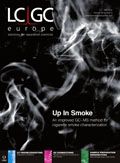Event News: 31st Montreux Symposium on LC–MS and MS–MS
The 31st Montreux Symposium on LC–MS and MS–MS will be hosted by the International Association of Environmental Analytical Chemistry (IAEAC) at the Aldershof Convention & Exhibition Centre, Berlin?Aldershof, Germany, on 4–6 November 2015.
31st Montreux Symposium on LC–MS and MS–MS
Image Credit: Courtesy of the Author

The 31st Montreux Symposium on LC–MS and MS–MS will be hosted by the International Association of Environmental Analytical Chemistry (IAEAC) at the Aldershof Convention & Exhibition Centre, BerlinâAldershof, Germany, on 4–6 November 2015. The Montreux Symposium series was first established in 1980 by the IAEAC, with the symposium historically alternating location between Montreux, Switzerland, and the USA. This year it will be held in Berlin-Aldershof, the location of the science campus of Humboldt-Universität and of Germany’s leading science and technology park.
The conference symposium will focus on the most recent developments in liquid chromatography coupled to mass spectrometry (LC–MS) and tandem mass spectrometry (MS–MS) in the three fields of metabolomics, lipidomics, and glycomics. These fields were selected because, aside from genomics and proteomics, the work in these areas is reshaping our understanding of biological processes and the development of therapies for diseases.
This symposium will bring together scientists working with up-to-date bioanalytical tools, particularly using separation techniques such as gas and liquid chromatography, electrophoresis, and ion mobility in combination with spectroscopy and mass spectrometry. They will join with enabling companies from those fields, who will have the opportunity to display the latest developments in all areas of MS and the separation sciences. The organizers promise firstârate presentations, posters presenting up-to-date research, and an exhibition highlighting new scientific instrumentation and technical information.
E-mail: analytik@chemie.hu-berlin.de • Website: www.lcms-montreux2015.de
7th International Symposium on Recent Advances in Food Analysis (RAFA 2015)
The 7th International Symposium on Recent Advances in Food Analysis (RAFA 2015) will take place at the Clarion Congress Hotel, Prague, Czech Republic, on 3–6 November 2015. The RAFA 2015 symposium will provide an overview of the current state-of-the-art on analytical and bioanalytical food quality, safety control strategies, and introduce the challenges for novel approaches in this field. The programme will be tailored to provide networking opportunities as well as exploring the latest results from the food analysis community. Presentations will be given by leading scientists through keynote lectures and contributed oral and poster presentations covering the topics of general food analysis issues and food quality/safety.
The conference programme will also be accompanied by several satellite events including workshops on novel analytical strategies and interactive seminars. An exhibition of recently introduced instrumentation in food analysis and other valuable equipment will be available during the symposium. Vendor seminars will also be organized to introduce recent developments and scientific strategies for advanced food quality and safety control.
Young scientists are encouraged to present their scientific work, with a number of RAFA 2015 Student Travel Grants available. The prestigious RAFA Poster Award will also be given for the best poster presentation by a young scientist, along with other sponsored poster awards. The deadline for registration at a reduced fee and submission of an abstract for oral presentation is 31 July 2015; deadline for submission of an abstract for poster presentation is 31 August 2015.
E-mail: rafa2015@vscht.cz • Website: www.rafa2015.eu
21–25 June 201542nd International Symposium on High Performance Liquid Phase Separations and Related Techniques (HPLC 2015)
International Conference Centre, Geneva, Switzerland
Tel: +41 22 839 84 84
E-mail: chairman@hplc2015.org
Website: www.hplc2015-Geneva.org
28 June–1 July 2015
Recent Developments in Pharmaceutical Analysis
University of Perugia, Perugia, Italy
Tel: +39 0755855131
E-mail: symposium@rdpa2015.com
Website: rdpa2015.chimfarm.unipg.it
30 June–3 July 2015
21st International Symposium on Separation Science
Grand Hotel Union, Ljubljana, Slovenia
Tel: +386 1 477 0265
E-mail: info@isss2015.si
Website: www.isss2015.si
3–6 August 2015
5th International Network of Environmental Forensics (INEF)
Victoria University College, Toronto, Canada
E-mail: inef2015@gmail.com
Website: www.inef2015.com
23–28 August 2015
35th International Symposium on Halogenated Persistent Organic Pollutants (Dioxin 2015)
Hotel Maksoud Plaza, Sao Paulo, Brazil
Tel: +55 11 3056 6000
E-mail: dioxin2015@acquacon.com.br
Website: www.dioxin2015.org
18–19 November 2015
PEFTEC International Conference and Exhibition for Petrochemical Analysis
Antwerp Exhibition Centre,
Antwerp, Belgium
Tel: +44 1727 858840
E-mail: info@peftec.com
Website: www.peftec.com


.png&w=3840&q=75)

.png&w=3840&q=75)



.png&w=3840&q=75)



.png&w=3840&q=75)










